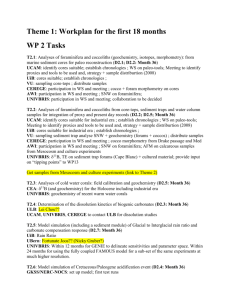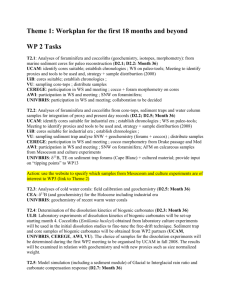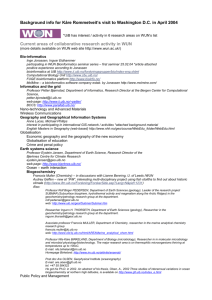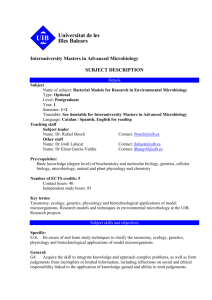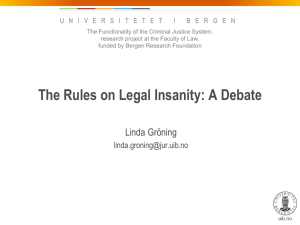MedViz Newsletter April 2014
advertisement
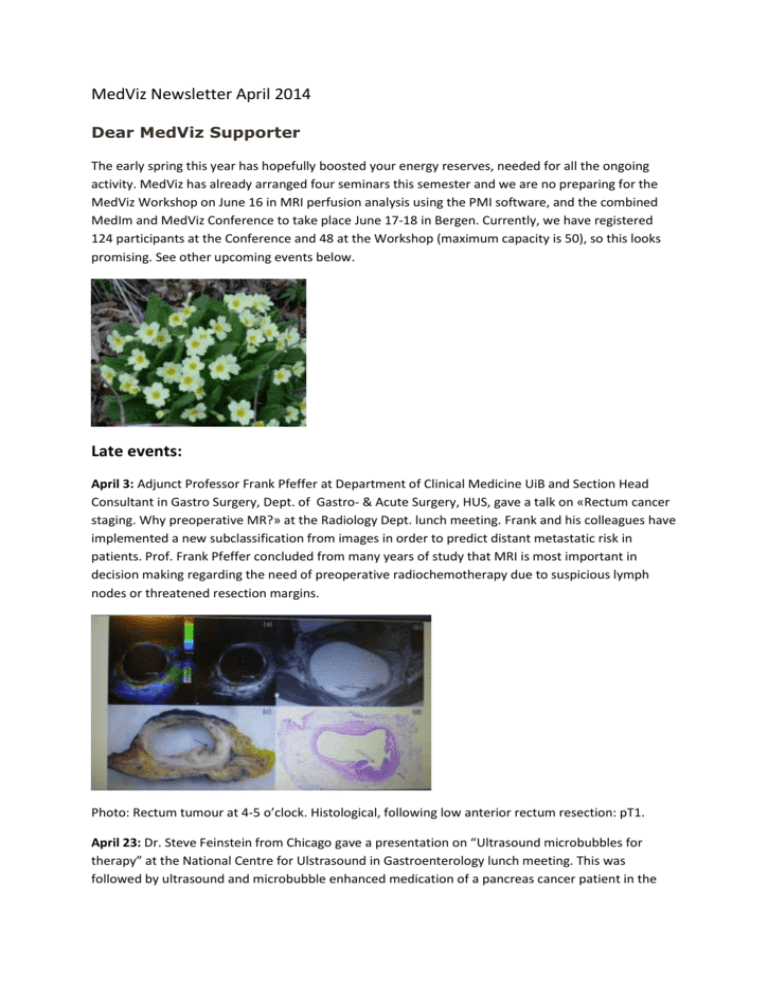
MedViz Newsletter April 2014 Dear MedViz Supporter The early spring this year has hopefully boosted your energy reserves, needed for all the ongoing activity. MedViz has already arranged four seminars this semester and we are no preparing for the MedViz Workshop on June 16 in MRI perfusion analysis using the PMI software, and the combined MedIm and MedViz Conference to take place June 17-18 in Bergen. Currently, we have registered 124 participants at the Conference and 48 at the Workshop (maximum capacity is 50), so this looks promising. See other upcoming events below. Late events: April 3: Adjunct Professor Frank Pfeffer at Department of Clinical Medicine UiB and Section Head Consultant in Gastro Surgery, Dept. of Gastro- & Acute Surgery, HUS, gave a talk on «Rectum cancer staging. Why preoperative MR?» at the Radiology Dept. lunch meeting. Frank and his colleagues have implemented a new subclassification from images in order to predict distant metastatic risk in patients. Prof. Frank Pfeffer concluded from many years of study that MRI is most important in decision making regarding the need of preoperative radiochemotherapy due to suspicious lymph nodes or threatened resection margins. Photo: Rectum tumour at 4-5 o’clock. Histological, following low anterior rectum resection: pT1. April 23: Dr. Steve Feinstein from Chicago gave a presentation on “Ultrasound microbubbles for therapy” at the National Centre for Ulstrasound in Gastroenterology lunch meeting. This was followed by ultrasound and microbubble enhanced medication of a pancreas cancer patient in the Clinical Research Unit, HUS, where several local experts participated. We also discussed potential future cooperation with the company GE Global Research, represented by Dr. Feinstein. Photo: Emmet McCormack, Linda Feinstein, Michiel Postema, Spiros Kotopoulis, Odd Helge Gilja and Steve Feinstein during their meeting at National Centre for Ulstrasound in Gastroenterology. April 24: Professor Arvid Lundervold, Department of Biomedicine, UiB, gave a talk about “Computational Medicine” at Dept. of Informatics, UiB. April 29: Workshop on Harm-Benefit Analysis of Animal Studies A fundamental part of MedViz activity is based on preclinical studies, building on animal experiments. Dr. Aurora Brønstad at UiB organized an international workshop in Scandic Hotel, Bergen for 27 participants, on behalf of the AALAS-FELASA Work Group, on the topic “Harm-Benefit Analysis of Animal Studies”. Generally speaking, according to international laws, we have to carry out harm-benefit analyses (HBA), but the laws do not tell us how to do it. The workshop intended to explore a better basis for the HBA concept. Most countries, however, share a common ethical core of principles, namely the 3 R’s and the 5 freedoms. The 3 R’s deals with the principles Reduction, Replacement and Refinement on how to improve the outcome of the experiments with less use of animals under better experimental conditions. The 5 freedoms, which were suggested to form the basis for harm assessment, deals with the freedom from hunger/ thirst, pain/injury, fear/distress, ability to express normal behavior and discomfort/husbandry. The challenge is then to define and be able to quantify the harms and the benefits, even if these are influenced by subjective assessments. Benefit domains included benefits for humans, animals, environment, knowledge and education. Secretary of Norecopa Adrian Smith also added the three S’s as evaluation criteria, namely good Science, good Sense and good Sensibility. Adrian also added that rough consensus can be a useful starting point. Another major challenge is the harmonization of global regulations. A potential conflict to the Ethics Committees is the determination of criteria to stop a study and remove an animal and the end-points decision. The participants in the workshop got a practical case example where they were challenged to fill in their evaluation in two harm-and-benefit tables. The case was formulated as an apparent conflict between a biotech company and Academia while using experimental animals. The goal from the biotech company was to determine if a drug was worthy of further proprietary development, whereas the goal for the academic institution was to evaluate and publish the impact of the compound on a hepatocyte receptor in the pathway for liver cirrhosis. The participants then had to return the filled in forms to the organizer to receive their course certificates, thus a pedagogic way to keep the attention of the participants throughout the workshop. April 30: Dr. Seán McCarthy gave a course in how to write a competitive proposal for Horizon 2020 in Egget, Studentsenteret, UiB for approximately 200 participants, which looks promising for the future potential financing of UiB research activities. Upcoming events: May 9: Information meeting about external finances by the Research Dept., HUS, Birkhaugsalen, 3rd floor, Sentalblokken May 11: Deadline for abstracts to the joint MedIm and MedViz Conference in June May 12 – 14: Nordic Research & Innovation network Conference 2014 at Solstrand Hotel May 16: Master, Research line and PhD students will receive acceptance letter for either poster or oral presentation at the joint MedIm and MedViz Conference in June May 20: MedViz meets with international partners in the H2020, PHC13 2nd stage proposal initiative May 23: MedViz Seminar in the MedViz Incubator, Møllendalsbakken 7 (12:00 – 13:00): Ass.Prof. Marc Streit, Inst. of Computer Graphics, Johannes Kepler University Linz, Austria: Visual analysis of biomedical data and Dr. Paolo Angelelli, Dept. of Informatics, UiB: Visual analysis of physiological data June 16: MedViz Workshop June 17-18: MedIm & MedViz Conference Ragnar Nortvedt Program Manager
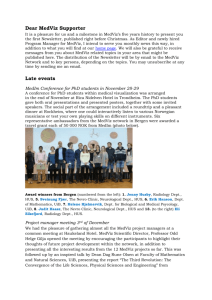
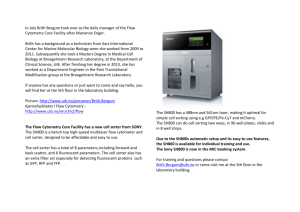
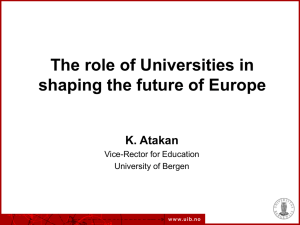
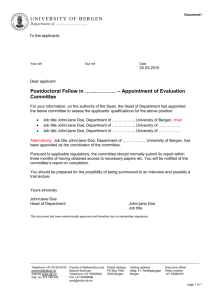
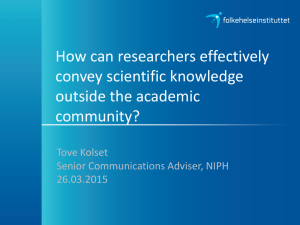
![StaffMobilityweek_EBP-1 [Compatibility Mode]](http://s3.studylib.net/store/data/008150283_1-b36c64246729e3bd98dde14ee6c15819-300x300.png)
